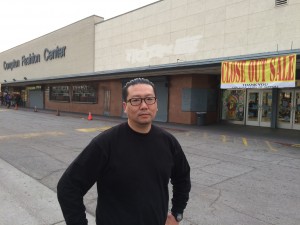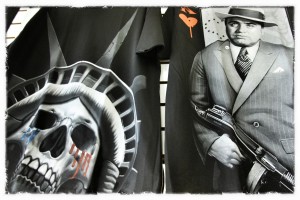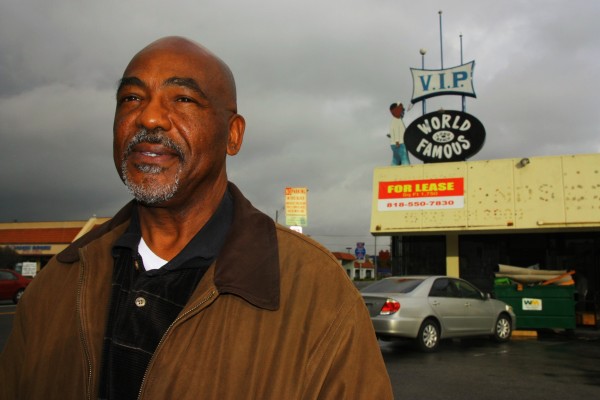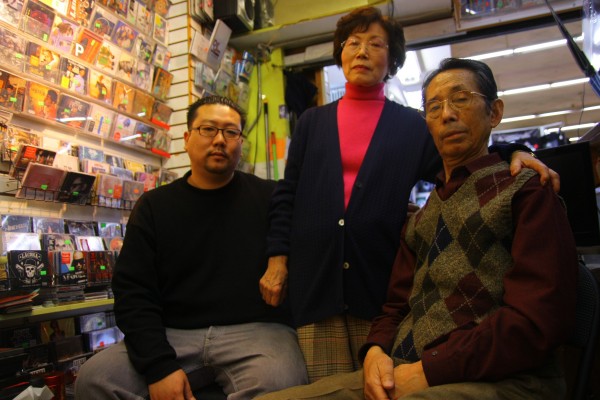A legendary Compton indoor swap meet is closing this week, and vendors say they believe it will be replaced by a Walmart.
 The Compton Fashion Center, 2100 N. Long Beach Blvd., closes Thursday after 32 years, during which time it revolutionized immigrant business formation in Southern California.
The Compton Fashion Center, 2100 N. Long Beach Blvd., closes Thursday after 32 years, during which time it revolutionized immigrant business formation in Southern California.
In a tersely worded December 1 letter to vendors, some of whom had been in the CFC since it opened, the owner, Soo Lee, told them they had 30 days to get out. That deadline was later extended another two weeks – leaving this Thursday as the day when the lights go out.
Shortly before Christmas, the center put up large signs announcing a “Close Out Sale” – and thanking customers for years of patronage – that vendors had not agreed to. Vendors say this left them with little time or opportunity reduce inventory and find a new location.
Of several CFC merchants I spoke with, all said they believe the space will be occupied by a Walmart, though the owner, Soo Lee, has said nothing about his plans for the enormous space. So this may be rumor as much as anything.
Walmart did not confirm a new store at the Compton swap meet. But the company didn’t quite deny one in the future, either. Here’s the statement a spokeswoman emailed me:
“While we are always looking for ways to better serve our Compton customers, we don’t have any new projects to announce.”
Okay. Still leaves the question of what will go into the center that was making the owner push the vendors out so abruptly after so many years in business.
Walmart last summer put a store in the new azalea Shopping Center in South Gate, four mil es away, and traffic was so heavy the store wasn’t able to keep its shelves stocked for the first few weeks, according to a shopping center spokeswoman.
es away, and traffic was so heavy the store wasn’t able to keep its shelves stocked for the first few weeks, according to a shopping center spokeswoman.
Of course, Walmart has also had problems locating inner-city stores in Southern California. Inglewood famously turned away the giant retailer, fearing it would lay waste to numerous mom-and-pop merchants.
“If Walmart comes, all the merchants on Long Beach Boulevard and around here will be wiped out,” said Kirk Kim, owner of Cycadelic Records, which has rented space near a swap meet entrance since CFC opened.
Compton Fashion Center opened in the space of what had been a Sears in 1983. It was the first large Korean-owned indoor swap meet in Southern California.
With that, in a region then becoming a magnet for immigrants from across the world, the indoor swap meet idea took off. Swap meets became a safe place for immigrants, speaking little English and without much capital, to wedge into a cranny of the American Dream.
Compton Fashion Center, in particular, drew people from all over with, in its heyday, 300 vendors selling jewelry,  makeup, music, cellphones, groceries and clothe.
makeup, music, cellphones, groceries and clothe.
“The holy grail of the hood,” one Yelp customer called it.
At Cycadelic Records in the 1980s, Kirk Kim’s father, the late Wan Joon Kim, and mother, Boo Ja — Korean immigrants who spoke little English – became the first to sell and promote the gangster rap then emerging from Compton garages. The couple, known as Pops and Mama, sold the first records by NWA frontman Eazy E, and dozens of other rappers that grew to chronicle the city’s crack-and-gang nightmare, as West Coast gangster rap became an international phenomenon. His shop and the center have been in numerous rap music videos.
But a lot has changed since then. National retailers have discovered the hood. Whether the indoor swap meet is slowly fading away is an open question.
Kirk Kirk believe the CFC owners have been keeping vendors out with an eye to attracting to a big-box retailer. Whatever the case, he said, foot traffic has dropped along with the number of vendors.
Last week, the center was slowly emptying. Stalls sat abandoned. Owners were boxing product and sweeping the floors.
“It’s sad. These folks are like my family,” he said. “I see these people more than I see my sister.”
Photos: Kirk Kim; t-shirts and dresses in booths at Compton Fashion Center.






